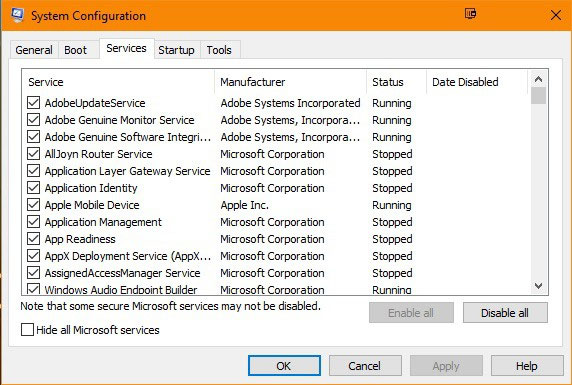Why is Windows slowing down after a period of use?
After a period of use, we have to reinstall Windows on the PC because it is getting slower and slower. Why does this happen? David Seidman, a former software engineer at Microsoft, will give an explanation to help us understand the cause of this problem.
According to David Seidman, Windows will not slow down over time if your PC except for updates does not install any additional software while ensuring a large amount of disk space.
Specifically, to know the exact cause of the problem, type "msconfig" in Run to see which services run when Windows starts. Usually, you will see at least 5 items including some quick launch services, update programs for third party software and some other services. Basically, these services are installed by users and they have implemented their functions properly, but it is also the reason why the computer slows down. Therefore, it is difficult to decide which one to turn off.

The services inside "msconfig" run with startup.
Starting with Windows 8, Microsoft tried to improve this issue.
In Windows 10 versions, the company has modified it so that when installing modern or universal applications it is not possible to set itself up to run the same system when booting like other desktop applications. At the same time, when not running in the background, these applications will not use any resources (CPU, RAM) except for limited background tasks so that it works properly. This makes it difficult for these types of applications to be the cause of a slowdown in a user's computer.
Besides, Microsoft also uses another update mechanism on the Store app store available on Windows to avoid third parties updating the application regularly.
Microsoft has also limited the number of services (services) that launch with Windows (since Windows 8 and above). This makes resources less expensive and helps Windows boot faster.
The real causes of Windows slow down
Fragmented hard drive
With new Windows versions, defragmenting the hard drive will be done by the operating system during breaks. However, the hard disk defragmentation feature will not be possible completely if the hard drive is too full. In addition, over time, hardware especially old flash drives will gradually deteriorate.

Microsoft has a built-in program to defragment hard drives inside Windows.
Free disk space
Usually, most of our programs and data reside in temporary memory (swap) on the hard drive when needed, and will be put into RAM, only a small part is put into memory. The data is fed into the small internal slots with fast access speed and the data on the hard drive is much slower. The system will fill the drive in the mechanism from the inside out, that is, from the exit slots that will push the swap memory memory further away. When the drive is full, the swap memory is also fragmented. This is also one of the reasons why your computer slows down so much. New operating systems have been equipped with features to combat this but unfortunately they only have very small efficiency.
PC infected with malware
When the computer was slow, many people deleted antivirus software on the machine in the hope of improving the speed of the device. But this makes their computers infected with malware. In fact, some users' computers may have installed malware that they did not know. When they remove antivirus software, the computer is no longer protected, the malware will rage and make it slow.

To ensure safety for users, Microsoft integrates Windows Defender quite deeply into Windows 10 system.
Web pages and browsers are becoming more and more complex
Web sites and browsers gradually become more complicated by more advanced web technologies along with the faster average computer speed. This makes their processing capability slower if compared to the system and hardware. To combat this, browser developers have tried to improve software performance but not very effectively. By improving the performance of the software is much harder with hardware.
In short, to fix your slow and slow PC, first check out where it comes from to get the best and most effective processing method. In addition, you should take care of and maintain your PC more often to avoid potential problems.
- Earth is slowing down, earthquakes will increase sharply in 2018
- Microsoft extends 'life cycle' for Windows XP
- Windows XP accelerator utility
- Baidu brakes growth
- Microsoft launched Windows Live Messenger messaging service
- Bring Windows Vista's 3D Flip 3D effect to Windows XP
- Prevent Microsoft from automatically downloading Windows 10 updates
- Remove nuisance in Windows
- 10 most free free games on Windows Phone 8
- Windows 10 supports logging with fingerprints, eyes, faces
- Free games and free on Windows Phone
- Combining fascinating puzzle game on Windows Phone
 What is the Snapdragon SiP chip?
What is the Snapdragon SiP chip? How to create a yellow circle around the mouse cursor on Windows
How to create a yellow circle around the mouse cursor on Windows Edit the Boot.ini file in Windows XP
Edit the Boot.ini file in Windows XP 3 ways to restart the remote computer via the Internet
3 ways to restart the remote computer via the Internet